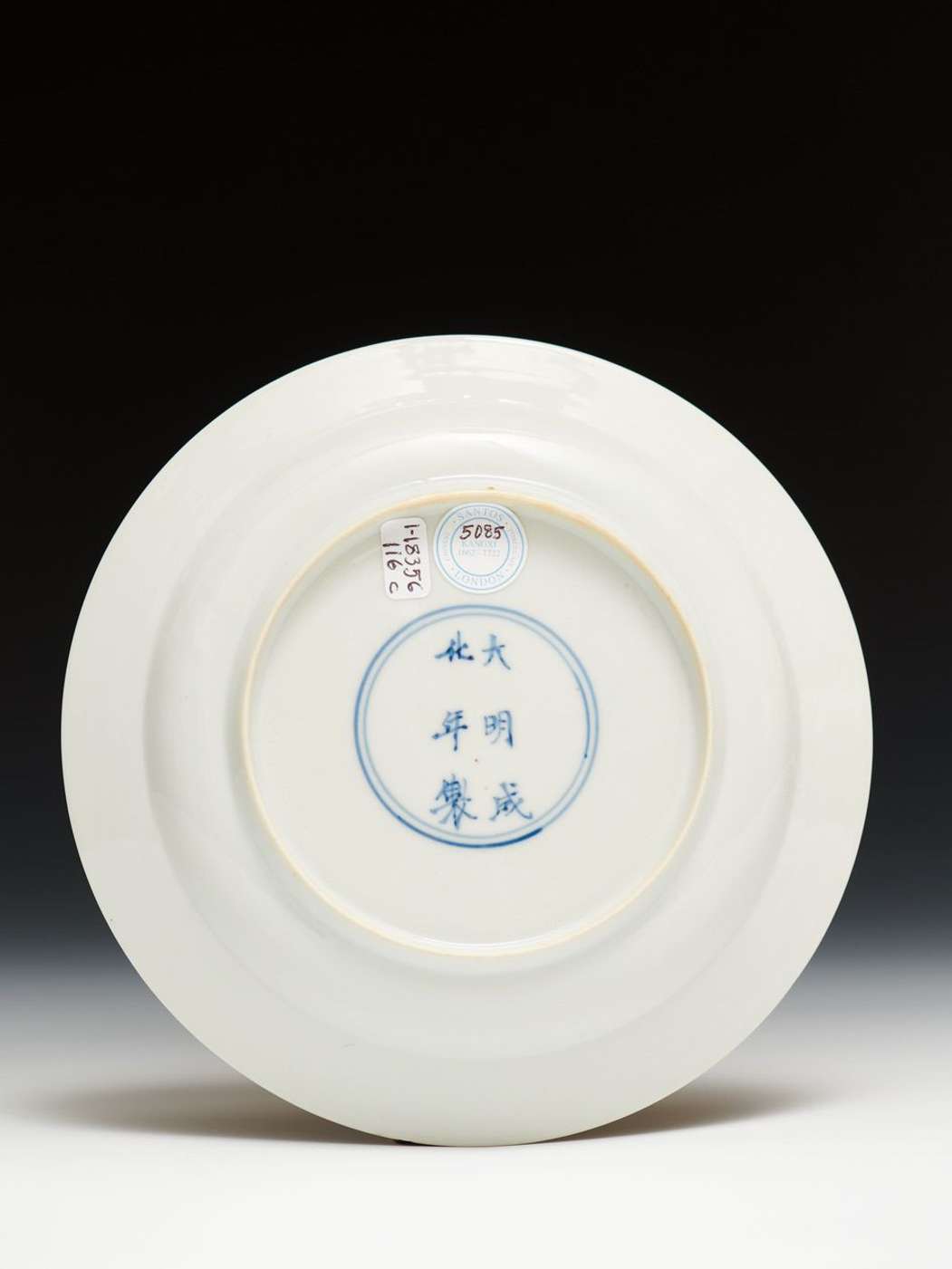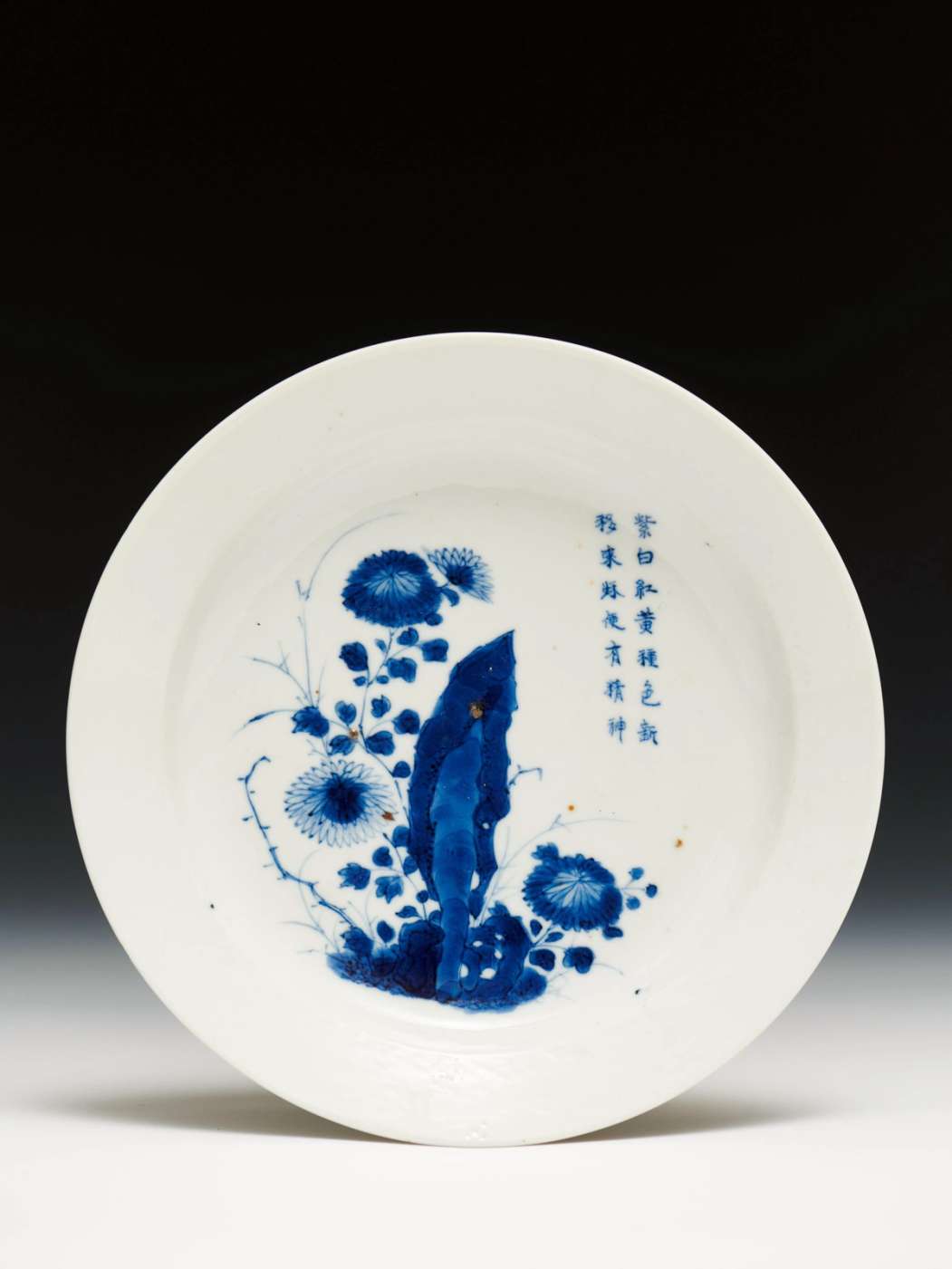Click the above image to zoom
Chinese porcelain plate decorated with chrysanthemum and poem. Kangxi.
Stock Number: 5083
Very rare Chinese export porcelain plate decorated in underglaze cobalt blue (qinghua) with chrysanthemum and the poem about the same flower, base with the Chenghua six-character mark but c. 1720, Kangxi reign, Qing dynasty, d. 16,5 cm, 6½ in. Bespoke box. 1-18354
• The Chinese characters on the plate reads from right to left:
line on the right: 紫白紅黃種色新
line on the left: 移來秋便有精神
are the first two lines of a poem from the novel the Two Fair Cousins.
The inscription (underlined) is part of a seven-characters six-lines verse:
紫白紅黃種色新,移來秋便有精神。
好從籬下尋高土,漫向簾前似前身。
莫言門閉官衙冷,香滿床頭已浹旬。
The poem, praising the beauty of chrysanthemum, has no title and no name of the poet or of the novel. Since "scholar and beauty" stories are mostly written by less qualified scholars, such as those who got lower scores at the imperial examination, they are not of the highest literary value, and the poems are often quite straight-forward.
A literal translation would be "Purple, white, red, yellow colour bright and fresh, blooming gorgeously in autumn". The first line is about the beauty of chrysanthemum, the second line could also imply that its beauty is refreshing, aside from blooming itself.
The only published translation into English of the whole poem was derived from a French one by M. Abel-Remusat published in 1827 by Hunt and Clarke, from York Street, Convent Garden [London].
Fair flower! for whose beauty’s kind nature united
Her deep purple shade, and her bright tints of snow;
In her gold she then decks’ thee, and lastly invited
Her carnation along the soft surface to glow.
By what hand wert thou flung from Elysium to earth?
And as thus through the lattice sweet flower, thou art peeping,
Must thou waste all thy bloom for a lone maiden's mirth.
Whilst the sage that should court all thy beauties is sleeping?
What a calm is around-'tis the stillness of heaven;
All liberty's soul seems too sweet in my breast,
And I feel as if now to my spirit’ were give,
To fly to some holier region of rest.
Few-few are the hours from the world I can steal,
To forget all its cares 'mod the balm of thy breathing;
Oh, give me on earth naught to see or to feel,
Through the long endless day, but thy fragrance and wreathing.
(We are grateful to Pui Ming Hung for his assistance with the research. Without his precious help this catalogue would be poorer.)
非常罕見的中國外銷瓷青花菊花詩文盤,盤底書成化六字款,約1720年,清康熙,直徑16.5釐米,6½英吋。
盤中詩文為(從右至左):
紫白紅黃種色新
移來秋便有精神
這兩句出自《玉梨嬌》(又名《雙美奇緣》)小說中的一首詩:
紫白紅黃種色新,移來秋便有精神。
好從籬下尋高土,漫向簾前似前身。
莫言門閉官衙冷,香滿床頭已浹旬。
這首詩雖然沒有標題,作者亦無處查詢,但它主要讚美了菊花的美麗。自古以來,才子佳人的故事多被人喜愛和講述。很多進京赴考卻落榜的文人亦偏愛此類題材,而他們寫的詩詞往往非常直白,所以文學價值並不太高。
詩的第一句純粹是讚美了菊花的美麗,第二句則是延伸到菊花的精神。這首詩的唯一英譯版本是Hunt及Clarke基於法文版翻譯,由倫敦約克街Convent花園M. Abel-Remusat 於1827年出版。
(特此鳴謝Pui Ming Hung先生提供的研究和幫助。如非他的準確解讀,我們無法得知如此詳細的信息。)


